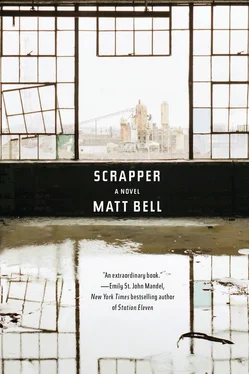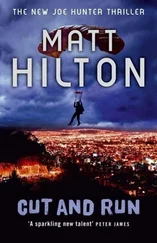See how in its minute softness each contact makes a microcosm of agitation, together becoming a million tiny firestarter universes rasping, chafing, scraping smaller than sight. All these particles no longer separated by even one matching bead of distance — all these millions of spaces collapsing and reopening and collapsing again — and into every such space a lick of oxygen moves. See the impossible silence of atoms touching atoms. See the cold mathematics of their possibilities, the way air is also fuel, how every contact carries the potential for heat, wanting only a sufficiency of friction, a single arc of electrostatic discharge — the dust could get in your lungs and kill you three decades from now or it could choke you dead today or it could explode without warning — and when one pair of rubbing particles ignites, the whole cloud goes, a booming conversion of matter to energy, the rumble and the blast filling the air with black sound.
See the entire plume becoming a pillar of flame leaping into the sky, looming high over the plant. See how in its hunger the fire pulls some portion of the sky back down, the back pressure sucking the fire out of the air and into the shivering building at the base of the flame, past the trucks and chains used to tear down the steel, past the wheelbarrows meant to carry it away, back over the scrappers crying out, as in every reachable room the quickening fire finds every other bit of fuel, every wooden thing hung thick with nettings of cobwebs and more dust, dust everywhere set in motion until a second blast ignites, thrusting new heat and pressurized air against the bounds of the building, concrete and mortar and brick shattering, steel warping, every surface radiant, until the walls burst, until the imploding pressure pulls down the ceilings and collapses the floors, until the crashing structure traps within it every man who came to tear it down, to take it away, every man but the lucky last. And if there is a better motor to thank than fear then as the last man flees into the fugitive night he thinks he doesn’t know its name.
WHEN KELLY SAVED THE BOY he was not yet again living any real life, just wallowing in the aftermath of terrible error. Later he would say he’d lived that year by his hands and by his back and by his shoulders and his wrists and his legs and his knees. The year of the body, he’d say, showing his opened fists, the thick white blistering of his calluses — and forget the head, never mind the heart. After the collapse began he’d barely thought, barely spoken, tried for a time to slow his thoughts to silence, or else to bury them with effort, exhaustion. He’d worked past the pains he’d known, found deeper places to lodge a throbbing, but then in the zone the incompleteness of every building became an inkblot for the subconscious. Whatever was missing would be supplied.
The farther he moved toward the center of the zone the more the neighborhoods sagged, all the wood falling off of brick, most every house uninhabited, the stores a couple thousand square feet of blank shelves, windows barred against the stealing of the nothing there. Paint scraped off concrete, concrete crumbled, turned to dust beneath the weather. Wind damage, water damage. Fire and flood. Before the zone Kelly had never known rain alone could turn a building to dust. But rain had flooded the Great Lakes, ice had sheered the cliffs of the state from off the land, shaped the dunes he’d dreamed of often after he’d left the state. The streets here were empty of traffic and in some neighborhoods the grass overran the sidewalks. He parked his truck, got out, walked the paved lanes instead. On trash days he could tell whether a house was occupied by whether or not a container appeared at the curb. There were other methods of determining inhabitation: the sound of televisions or radios, the presence of cut grass. But some men cut the grass for their neighbors to hide how they were the last ones living on their block. A way of pretending normality, despite the boarded windows, the graffiti, the other front doors never opened. Despite the absolute absence of other cars, other human voices.
Mostly it was easier. Mostly there was no question where there were people left behind. The only questions he had to ask were about opportunity, risk, metal.
Whenever Kelly entered an uninhabited house he understood he entered some life he might have lived, how the emptiness of every room pulled him inside out. A furnishing of the self. He opened the front door and the house ceased its stillness. If it had ever been inert it wasn’t now. No structure was once it held a human consciousness. In the South Kelly had worked construction, had seen firsthand how a house unlived in wasn’t a house. It was so easy to awaken a place. The way a doorknob awoke a memory. The way the angles of a room recalled other rooms. There were blueprints etched across his memories, and in some houses those memories activated: the bedrooms of his parents, the bedrooms of his parents’ friends. An angle of light like one he’d lain in as a child, reading a book on birds. The deep dark of a basement, the other dark of an attic. How the fear of the dark hung at the lip of a basement stairs, how it hesitated at the foot of any stairs leading up, toward whatever was below or above the house, outside its public space.
With his smartphone he could check the prices of what he salvaged: the amounts offered changed day to day but he couldn’t wait days to sell what he’d dug. At the salvage yards the workers weighed the truck loaded and then they weighed the truck empty, paid him a price multiplied against the difference. The salvage men photocopied his ID, took an inky thumbprint. This was a legitimate business, they said. They asked where he’d gotten the scrap and he lied. They asked again and he took a lower price per pound.
Whatever the salvage yards wouldn’t take he took to other men, brokers running scrap out of a backyard or an idle warehouse. There was no trouble with space. There was space everywhere. The unofficial yards kept unofficial hours. You could show up in the middle of the day and find the place deserted, show up at midnight and find three guys playing cards, getting high, cutting scrap. They paid a fraction of the price, the price of no questions asked. Whatever was suspect they’d break until it was sellable. There were scrapyards where no one asked these brokers questions, contractors who would mix the questionable stuff with more honest trade.
Once he’d arrived to find a man cutting a copper statue with a power saw. The man shirtless, skin gleaming, working without eye protection, a stub of a cigarette clamped in his mouth. The statue’s arms sawed at the elbows. The head on the ground. The saw working its way through the torso at a steep diagonal. The kerf of the cut wide like a wound from a sword. Then the smashing the hands with a sledge. Then the mutilating the head into unrecognizable shards.
Broker : a ridiculous word for such a man but everyone self-justified. Everyone wanted to be more than what they were.
The salvage men reminded him: it wasn’t the function they sold but the form. It didn’t matter if he broke a broken refrigerator. What mattered was getting it to the truck without straining his back. There was more steel and iron than anything else but they paid the least of anything. A hundred pounds of copper pipe paid more than double a truckload of steel. Same for copper wire, copper cable. You could ransack the rooms of a house but the best stuff was hidden behind the walls. It wasn’t the metal that held the house up but you wouldn’t want to live there with it gone.
Kelly could picture the city’s glory days but it took a certain imagination. On the television in his barely furnished apartment he watched a blonde reporter say the collapse was still in progress but now it was down to the aftershocks. Sometimes the news interviewed one of the left behind. Once this man or woman had been an autoworker or a grocery clerk like anyone else. What mysteries they were now, the blonde reporter said, these unemployed men and women with their forlorn streets, their locked doors nested behind locked doors.
Читать дальше












